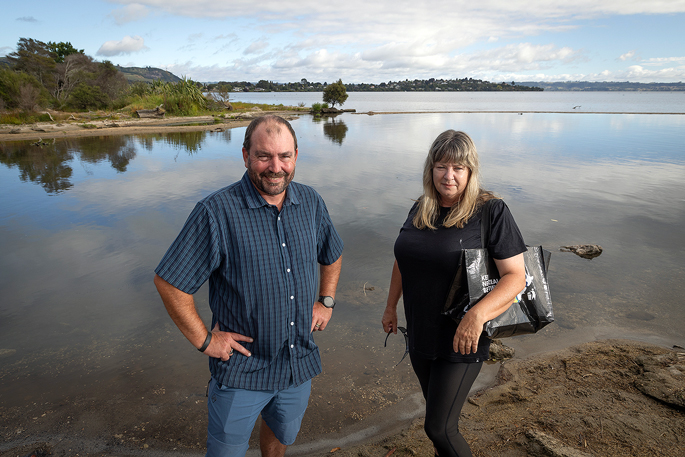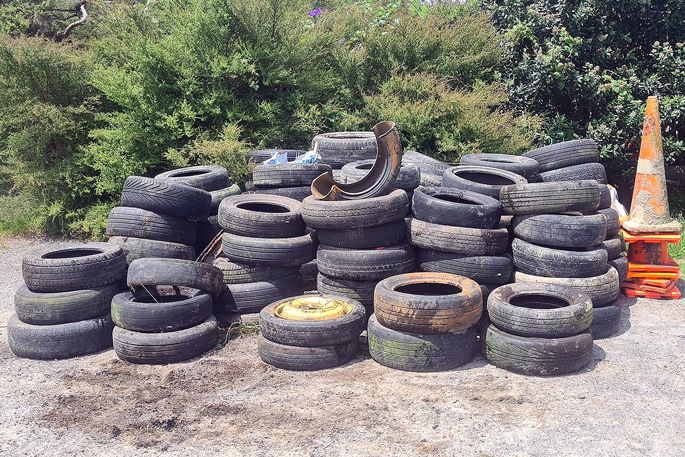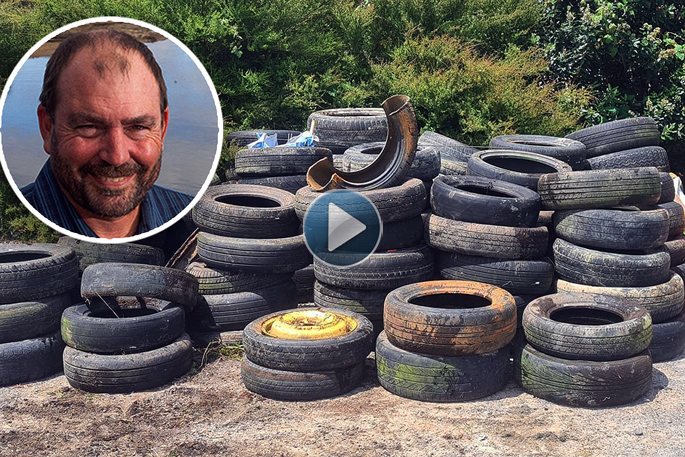A Rotorua resident has spent his own time removing masses of rubbish from a local stream including a whopping 87.5 dumped tyres in only one day.
Along with road cones and other debris, the rubbish had made its way from various points along the city’s southwest until it reached Lake Rotorua – and was removed from the Utuhina Stream mouth by Gary Coker, his daughter, and a friend.
Now, he and another volunteer have shared their hopes for a volunteer network - and their desire to see the city take the 2024 Beautiful Awards crown.
Last year, Restore Rotorua member Tracey McLeod collected 12 shopping trolleys worth of rubbish, mostly from the area around Pererika St, and usually alone.
McLeod also mowed overgrown berms and her efforts for both were recognised in December when she was announced as the Keep New Zealand Beautiful Tidy Kiwi Volunteer of the Month.
Coker, who works as Rotorua Lakes Council’s open spaces operations advisor but spoke to Local Democracy Reporting as a resident, has for years spent his own time cleaning up litter and rubbish around the city.
His previous finds included live ammunition, old cellphones, rusty, jagged metal and broken glass in Lake Rotorua.
Last month, he, his daughter and a friend collected 87.5 tyres from the Utuhina Stream mouth, along with road cones, a double car seat, a shopping trolley and a skip bin full of glass, plastic, metal and other rubbish.
He called the stream an “absolutely gorgeous awa”, but had noticed rubbish increasing over the past decade and wanted to do something about it.
Both Coker and McLeod wanted the city to enter the 2024 Beautiful Awards for Most Beautiful Small City.
 At the Utuhina Stream mouth, Rotorua residents Gary Coker and Tracey McLeod swap stories of voluntary litter collection in the city. Photo / Andrew Warner.
At the Utuhina Stream mouth, Rotorua residents Gary Coker and Tracey McLeod swap stories of voluntary litter collection in the city. Photo / Andrew Warner.
Rotorua won the award in 1999, 2000, 2002, 2006, 2009 and 2010.
“I know from the years that it was done there quite a lot of civic pride driving around the city, seeing those signs … and certainly, you know, in this day and age, a bit of pride in the city would go a long way, that’s for sure,” Coker said.
McLeod said it would draw people to the tourist town, and hoped Rotorua could swipe the supreme crown from Taupō.
She believed there needed to be a bigger focus on clearing rubbish, particularly from the city’s reserves.
There had been a “concerted effort” in getting grass mowed compared to this time last year, she said, and was “impressed” with how Coker worked to get maintenance requests in open spaces resolved.
The pair said they want to see Rotorua’s network of clean-up volunteers connect for cohesive and collaborative litter-removal in the city.
Coker had set up a Facebook page aiming to meet like-minded residents keen to join his clean-ups.
“Hopefully I can tackle more areas, bigger areas and make a difference to clean up Rotorua.”
For future clean-ups, the Bay of Plenty Regional Council provided protective gear such as gloves, rubbish pickers and high-vis vests. The district council provided rubbish bags that would be collected once filled.
 Gary Coker collected 87.5 tyres from the Utuhina Stream mouth in one day. Photo / Supplied.
Gary Coker collected 87.5 tyres from the Utuhina Stream mouth in one day. Photo / Supplied.
Rotorua Lakes Council infrastructure and environment group manager Stavros Michael said RotoruaNZ, as the district’s destination marketer, submitted an entry for the 2023 Keep New Zealand Beautiful awards.
The city won the Best Loo Award for the toilet at Okere Falls Scenic Reserve.
“There has been no discussion about submitting an entry for the 2024 awards. Any such decision would need to be balanced against availability of resources and other priorities. We do not have dedicated resource for award entries.”
As for the clean-ups, he said it was always disappointing to see rubbish in public places and was “very appreciative” of community members helping to tidy up.
Michael said it worked with local community groups on clean-ups, provided support to encourage change at a neighbourhood level and educated locals on sustainable environmental practices.
He previously said cleaning up litter in the CBD, parks and reserves was handled by Infracore.
“Litter on our suburban berms and streets is either tidied up by neighbourhood locals or when the road sweeper goes through under the roading contract.”
LDR is local body journalism co-funded by RNZ and NZ On Air.




0 comments
Leave a Comment
You must be logged in to make a comment.